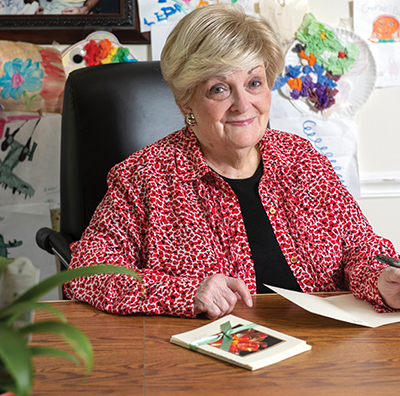Women and Heart Disease: Don’t Ignore the Signs
During Breast Cancer Awareness Month, you may feel like you are seeing pink items everywhere you go. But for women, it’s also important to see red.
Both breast cancer and heart disease are major health risks for women—in fact, the conditions can sometimes be interrelated. But while most women are aware of breast cancer risk, only about half of American women recognize heart disease for the threat it is, according to the Centers for Disease Control and Prevention. That lack of awareness leads to increased rates of stroke and heart attacks. Even health care professionals sometimes miss the symptoms and severity of heart disease among women.

Take Martha Cammarata, RNC, BSN, for instance. The retired psychiatric nurse spent 33 years caring for patients at MedStar Montgomery Medical Center. She has been diagnosed with atrial fibrillation and even has a pacemaker.
But despite Martha’s professional—and personal—history, she wasn’t ready to blame heart disease for the unusual pressure and pain she felt in her chest this past summer.
“I have a hiatal hernia and a history of acid reflux,” the 77-year-old says today. “And I really, really wanted to believe that was all there was to it. So, I waited 12 hours before going to MedStar Montgomery’s Emergency department.”
That’s often the case with women, says MedStar Montgomery cardiologist Estelle Jean, MD, who was on call when Martha arrived at the hospital.
“Because our symptoms can be more subtle than men’s, women often attribute the source of their discomfort to gas or indigestion when the real culprit is the heart,” Dr. Jean explains. “Plus, many women have spent a lifetime placing the care of husbands, kids, and others above caring for themselves, unintentionally jeopardizing their own health.”
Luckily for Martha, the cardiologists at MedStar Montgomery are experts in diagnosing and managing heart disease. A close relationship with the MedStar Heart & Vascular Institute at MedStar Washington Hospital Center further assures the very highest quality of cardiovascular care all along the spectrum.
Concerned by what she saw during Martha’s initial exam, Dr. Jean admitted her for overnight observation. When a nuclear stress test came back with abnormal results, Martha soon found herself in MedStar Heart & Vascular Institute’s advanced cardiac catheterization lab. There, interventional cardiologists discovered a severe blockage in her left coronary artery, an extremely dangerous situation. In fact, blockages like Martha’s are routinely referred to as “widow makers” due to their tendency to cause massive heart attack and death.
Specialists quickly inserted a stent to prop open Martha’s artery, restoring blood flow back to her heart and stabilizing her condition. Two days later, she was home.
“I have to admit I was shocked by the turn of events,” Martha says. “I spent my entire career as a nurse, but at the time, I was in denial. I kept on thinking, ‘This is not happening to me.’ When you’re personally in the throes of the situation, it can be overwhelming.”
So, Martha now has this advice for others.
“Be aware of your own body and unusual changes,” she says. “Be informed and your own best advocate. And lastly, when in doubt, check it out. There are no stupid questions when it comes to your health!”
FOR BREAST CANCER SURVIVORS, HEART SCREENING IS SMART
“We all need to be mindful of our cardiac health, but women who have been treated for breast cancer should take special care to stay heart healthy,” says cardiologist Estelle Jean, MD.
Breast cancer and heart disease share several risk factors, including age, smoking, and excess weight. Recent research also suggests that some forms of breast cancer treatment, including certain types of radiation and chemotherapy, can increase the risks for heart disease.
Women who are being treated for breast cancer or have been treated for breast cancer in the past should talk to their doctor about how to manage their cardiac risk factors. Diet and exercise can help prevent heart disease from developing, and regular cardiac screening can ensure that if heart disease does develop, it is detected when it is still early and most easily treatable.
“The relationship between some breast cancer therapies and heart disease should absolutely not scare women away from breast cancer treatment,” stresses Dr. Jean, “but it should increase their awareness of their cardiac health. Knowledge is power—knowing your risk means you can take steps to stay healthy.”
To learn more, visit MedStarMontgomery.org/Heart or call (301) 570-7404 to make an appointment. You can also follow Dr. Jean on Instragram, Twitter, and Facebook as DrEstelleJean.









